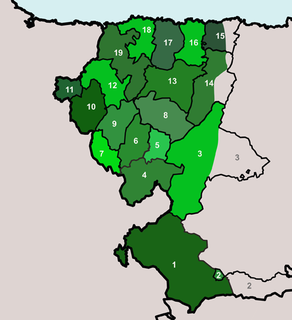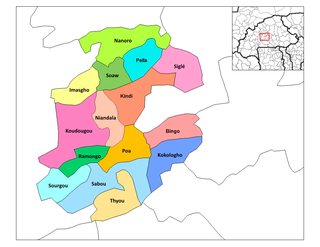The Iberian language was the language of an indigenous pre-Migration Period people identified by Greek and Roman sources who lived in the eastern and southeastern regions of the Iberian Peninsula. The ancient Iberians can be identified as a rather nebulous local culture between the 7th and 1st century BC. The Iberian language, like all the other Paleohispanic languages except Basque, became extinct by the 1st to 2nd centuries AD, after being gradually replaced by Latin.

Galician-Asturian or Eonavian is a set of Romance dialects or falas whose linguistic dominion extends into the zone of Asturias between the Eo River and Navia River. The dialects have been variously classified as the northeastern varieties of Galician, as a linguistic group of its own, or as a Galician dialect of transition to the Astur-Leonese group.

Veleia was a Roman town in Hispania, now located in the Basque Autonomous Community, Spain. The site is located in the municipality of Iruña de Oca, 10 kilometers west of Vitoria. The town was an important station on the Roman road ab Asturica Burdigalam that ran parallel to the coast of the Bay of Biscay. At its apogee, the city could have been inhabited by some five to ten thousand people, and apparently went through different cycles of prosperity and decline into the Early Middle Ages until it was finally abandoned.

The history of Barcelona stretches over 2000 years to its origins as an Iberian village named Barkeno. Its easily defensible location on the coastal plain between the Collserola ridge (512 m) and the Mediterranean sea, the coastal route between central Europe and the rest of the Iberian peninsula, has ensured its continued importance, if not always preeminence, throughout the ages.
Tetrafluoroberyllate or orthofluoroberyllateBeF2−
4 is an anion containing beryllium and fluorine. The ion has a tetrahedral shape, the same size and outer electron structure as sulfate. Therefore, many compounds that contain sulfate, have equivalents with tetrafluoroberyllate. Examples of these are the Langbeinites, and Tutton's salts.
This is a timeline of women's ordination in America.
Wild Rover is an album by The Dubliners that was released in 2011. The album charted at number 55 in Ireland.
Zayas is a Castilian surname rooted in the toponym of the same name, which itself derives from the Basque word zai, meaning watchman or guard.
The 2015–16 Ascenso MX season began July 25, 2015 and is divided into two tournaments named Apertura 2015 and Clausura 2016. The Ascenso MX is the second-tier football league of Mexico. All Ascenso MX teams except FC Juárez and Cimarrones de Sonora, will also participate in Copa MX.






